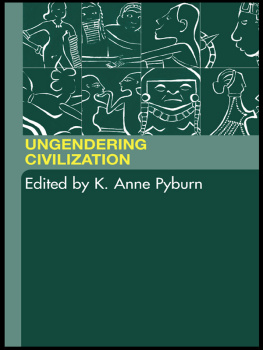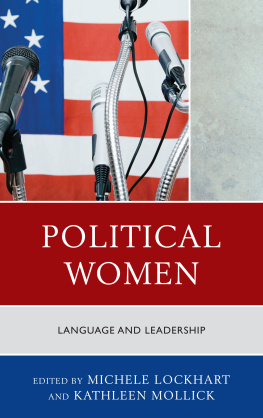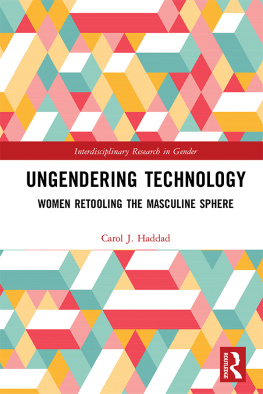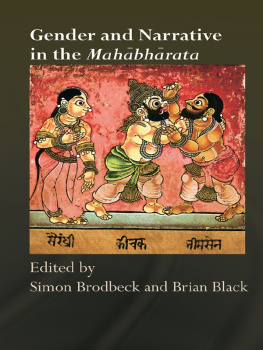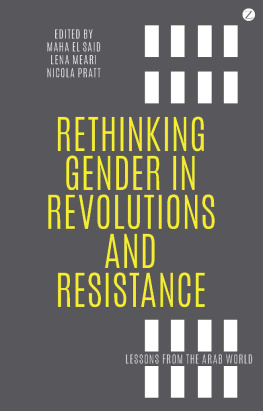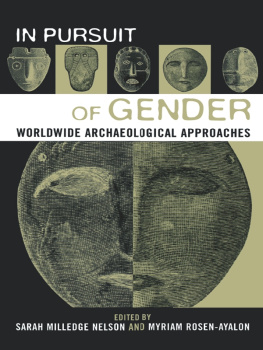Ungendering Civilization
A pioneering and provocative collection, firmly anchored by the editors explanation of the conceptual framework. It shows that we cannot assume the cross-cultural event that women lose status with the rise of civilization, a notion that has tacitly driven much gender archaeology. By drawing our attention to all the ways in which and the reasons why we cannot essentialize either the women or the gender system, the volume forces a complete re-thinking of the issue of gender in/of civilization. A critical contribution to a theoretically informed exploration of past human social life.
(Margaret W. Conkey, Professor of Anthropology, University of California, Berkeley)
Ungendering Civilization offers a much needed scrutiny of the role of women in the evolution of states, critically addressing traditional views of male and female roles. Each chapter examines a distinct body of archaeological data, from Predynastic Egypt and Minoan Crete, to ancient Zimbabwe and the Maya, to determine what can justifiably be argued from the evidence.
The collection also shows that cultural evolutionism is not benign; it sustains political views about gender, race, and political economy that are not supported by research. The example of gender demonstrates how archaeologists, many of whom would probably characterize themselves as feminists, inadvertently support a sexist view of the world by labeling poorlytested assumptions as science.
K. Anne Pyburn is Associate Professor of Anthropology at Indiana University. She is the director of the Chau Hiix Project, which investigates the political economy of an ancient Maya community, and the MATRIX Project, http://www.indiana.edu/~arch/saa/matrix/.
Ungendering Civilization
Edited by K. Anne Pyburn
First published 2004 in the USA and Canada
by Routledge
29 West 35th Street, New York, NY 10001
Simultaneously published in the UK
by Routledge
11 New Fetter Lane, London, EC4P 4EE
Routledge is an imprint of the Taylor & Francis Group
This edition published in the Taylor & Francis e-Library, 2004.
2004 selection and editorial matter, K. Anne Pyburn; individual chapters, the contributors
All rights reserved. No part of this book may be reprinted or reproduced or utilized in any form or by any electronic, mechanical, or other means, now known or hereafter invented, including photocopying and recording, or in any information storage or retrieval system, without permission in writing from the publishers.
Library of Congress Cataloging in Publication Data
A catalog record for this book has been requested
British Library Cataloguing in Publication Data
A catalogue record for this book is available from the British Library
ISBN 0-203-50118-7 Master e-book ISBN
ISBN 0-203-57000-6 (Adobe eReader Format)
ISBN 0-415-26057-4 (hbk)
ISBN 0-415-26058-2 (pbk)
For Richard R.Wilk
Contributors
Cristina Alcalde received her PhD in Anthropology in 2003 from Indiana University. She also has an MA in Latin American Studies. Her dissertation fieldwork focused on the everyday experiences and forms of resistance of poor women in abusive relationships in Lima, Peru.
Layla Al-Zubaidi studied Cultural Anthropology, Archaeology and Islam Studies at the Free University, Berlin in Germany, and at Indiana University, Bloomington in the United States. She worked in archeological excavations in Europe and the Middle East and wrote her MA thesis on cultural tourism at the UNESCO World Heritage Site, Palmyra, Syria. She is currently based in Ramallah, Palestinian Territories, where she holds a position in a German Green Party political foundation, researching sustainable development, womens rights, and freedom of expression
Sean P. Dougherty has an MA in Classical Studies from Indiana University and is currently pursuing a PhD in physical anthropology at that institution. He has done field research in Belize and Egypt; his doctoral research concerns patterns of trauma among a nineteenth-century pauper cemetery population in Milwaukee, WI.
Candice Marie Lowe is a Pre-Doctoral Fellow at the Carter G. Woodson Institute for African-American and African Studies at the University of Virginia, and a doctoral candidate in Socio-Cultural Anthropology at Indiana University. She has a background in feminist theory and Central Asian Studies, particularly in the client states of the former Soviet Union. In her dissertation, Speaking Our Name: Multiculturalism and the Struggle for National Belonging Among Afro-Creoles in Mauritius, she explores her interests in African diaspora studies, postcolonial nationalism, multiculturalism, gender, music, and social protest formations.
Tracy Luedke is a doctoral candidate in the Department of Anthropology and Visiting Lecturer in the Department of Gender Studies at Indiana University. Her dissertation concerns healing in central Mozambique.
Lena Mortensen is the Assistant Director of the Center for Heritage Resource Studies and a PhD candidate in anthropology at Indiana University. She specializes in the social context of archaeology with particular interests in heritage tourism and Central America. She has several publications based on her research on the interrelations between nationalism, politics, tourism, and science in the daily operations of the Copan archaeological park in Honduras.
Laura Pate is a Prehistory Research Fellow at the Glenn Black Laboratory of Indiana University. Her research interests include mortuary practices and ceramic analysis of the native American cultures of the midwestern United States. She is pursuing a PhD in anthropology at Indiana University.
K. Anne Pyburn is Associate Professor of Anthropology at Indiana University. She writes about archaeology and ethics, gender, and the Maya. She is principle investigator of the Chau Hiix Project (Belize) and director of the MATRIX Project. http://www.indiana.edu/~arch/saa/matrix/homepage.html.
Gabriel D. Wrobel is an Assistant Professor in the Department of Sociology and Anthropology at the University of Mississippi where he specializes in bioarchaeology and mortuary practices. He has done fieldwork in Egypt and Belize.
Preface
This book began as a seminar at Indiana University. I had an idea that we might learn something if we looked at several cultures at the point in their history when evidence of status distinctions is first recognizable in their material record. I expected that we would find little that was concrete, as indeed turned out to be the case, and that what evidence we found would show clearly that women constituted a subordinate class. Much to my surprise, we did not find clear support for this. What we did find was that most archaeologists expect to find it, and without testing the premise, simply assume that it is supported when they interpret their data.
As the participants worked through the literature on gender in early states, another issue became clear. Assumptions about gender and the division of labor in ancient cultures provide an excellent example of how the typological reasoning of cultural evolutionary explanations predetermines and drastically limits what we can know about the past. So while this book addresses the issue of the role of women in the evolution of states, we also question the fundamental assumption that there is much usefulness in teleological generalizations. Discounting assumptions about the division of labor causes the typology of cultural evolutionism to unravel. On the other hand, inspecting the intellectual history of such categories as race, gender, and chiefdom is a good empirical exercise which reveals the political usefulness that accounts for their never-ending popularity among western academics. Power comes not from being at the apex of the hierarchy of types, but from the ability to name and identify the types. A typology of people, whether organizational or biological, limits scholarly awareness of variation; in fact it limits our ability to see that the categories may actually be wrong. On the other hand, when these categories are reified in the context of political power, whether in an academic department or in a colonial plantation, human possibility is molded and constrained.

